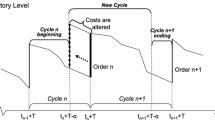Abstract
This paper presents a Markov decision process for managing inventory systems with Markovian customer demand and Markovian product returns. Employing functional analysis, we prove the existence of the optimal replenishment policies for the discounted-cost and average-cost problems when demand, returns, and cost functions are of polynomial growth. Our model generalizes literature results by integrating Markovian demand, Markovian returns, and positive replenishment lead times. In particular, the optimality of the reorder point, order-up-to policies is proved when the order cost consists of fixed setup and proportional cost components and the inventory surplus cost is convex. We then make model extensions to include different cost components and to differentiate returned products from new ones. Finally, we derive managerial insights for running integrated closed-loop supply chains. At the aggregate level, returns reduce effective demand while many structural characteristics of inventory models are intact. A simple heuristic for managing systems with returns is to still utilize literature results without returns, but effective demand is lower than customer demand.

Similar content being viewed by others
References
Fleischmann, M., Bloemhof-Ruwaard, J.M., Dekker, R., van der Laan, E., van Nunen, J.A.E.E., Van Wassenhove, L.N.: Quantitative models for reverse logistics: a review. Eur. J. Oper. Res. 103(1), 1–17 (1997)
Rogers, D.S., Tibben-Lembke, R.S.: Going Backwards: Reverse Trends and Practices. Reverse Logistics Executive Council, Pittsburgh (1999)
Flapper, S.D.P., van Nunen, J., Van Wassenhove, L.N.: Managing Closed-Loop Supply Chains. Springer, Berlin (2005)
Heyman, D.P.: Optimal disposal policies for a single-item inventory system with returns. Nav. Res. Logist. Q. 24, 385–405 (1977)
Li, X., Olorunniwo, F.: An exploration of reverse logistics practices in three companies. Supply Chain Manag. 13(5), 381–386 (2008)
Olorunniwo, F., Li, X.: An overview of some reverse logistics practices in the United States. Supply Chain Forum 12(3), 2–9 (2011)
Song, J., Zipkin, P.: Inventory control in a fluctuating demand environment. Oper. Res. 41( 2), 351–370 (1993)
Benedito, E., Corominas, A.: Assessing the impact on optimal production capacities in a closed-loop logistics system of the assumption that returns are stochastically independent of sales. J. Ind. Eng. Manag. 4(3), 504–522 (2011)
Jin, X., Ni, J., Koren, T.: Optimal control of reassembly with variable quality returns in a product remanufacturing system. CIRP Ann. 60, 25–28 (2011)
Wongthatsanekorn, W., Realff, M.J., Ammons, J.C.: Multi-time scale Markov decision process approach to strategic network growth of reverse supply chains. Omega 38, 20–32 (2010)
Fleischmann, M., Kuik, R.: On optimal inventory control with independent stochastic item returns. Eur. J. Oper. Res. 151(1), 25–37 (2003)
Heyman, D.P., Sobel, M.J.: Stochastic Models in Operations Research. McGraw-Hill, New York (1984)
Scarf, H.: The optimality of (S,s) policies in the dynamic inventory problem. In: Arrow, K.J., Karlin, S., Suppes, P. (eds.) Mathematical Models in the Social Sciences, pp. 196–201. Stanford University Press, Stanford (1960)
Sethi, S.P., Cheng, F.: Optimality of (s,S) policies in inventory models with Markovian demand. Oper. Res. 45(6), 931–939 (1997)
Beyer, D., Sethi, S.P., Taksar, M.: Inventory models with Markovian demands and cost functions of polynomial growth. J. Optim. Theory Appl. 98(2), 281–323 (1998)
Holt, C., Modigliani, F., Muth, J.F., Simon, H.A.: Planning Production, Inventory, and Workforce. Prentice-Hall, Englewood Cliffs (1960)
Beyer, D., Sethi, S.P.: Average-cost optimality in inventory models with Markovian demands. J. Optim. Theory Appl. 92(3), 497–526 (1997)
Ross, S.: Introduction to Probability Models. Academic Press, San Diego (2000)
Sennott, L.I.: Average cost optimal stationary policies in infinite state Markov decision processes with unbounded costs. Oper. Res. 37(4), 626–633 (1989)
Derman, C.: Denumerable state Markovian decision processes-average cost criterion. Ann. Math. Stat. 37(6), 1545–1553 (1966)
Author information
Authors and Affiliations
Corresponding author
Additional information
Communicated by Po-Lung Yu.
Rights and permissions
About this article
Cite this article
Li, X. Managing Dynamic Inventory Systems with Product Returns: A Markov Decision Process. J Optim Theory Appl 157, 577–592 (2013). https://doi.org/10.1007/s10957-012-0192-5
Received:
Accepted:
Published:
Issue Date:
DOI: https://doi.org/10.1007/s10957-012-0192-5




